Trump impeachment inquiry: 10 developments you may have missed
Transcripts, scheduled public hearings and more depositions: What happened this week in the Trump impeachment inquiry?
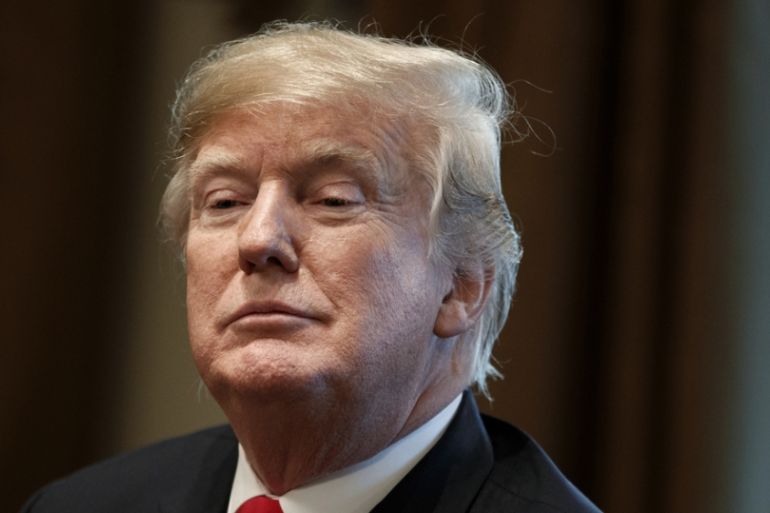
Democrats leading the House of Representatives’s impeachment inquiry of US President Donald Trump took a significant step this week, announcing the first public hearings of the probe.
The hearings, scheduled for next week, come after House investigators released the transcripts from closed-door sessions with a number of key witnesses.
Keep reading
list of 3 itemsTrump impeachment inquiry: Public hearing schedule
Read the redacted whistle-blower complaint involving Trump
This week’s developments also included a witness revising his testimony after his memory was “refreshed”, and a report that Trump sought a public declaration from the Department of Justice clearing him of any wrongdoing – a report the US president denied.
The impeachment investigation is focused on a July 25 phone call in which Trump asked Ukrainian President Volodymyr Zelenskyy to investigate former Vice President Biden, a leading Democratic rival, and his son Hunter, who was on the board of a Ukrainian gas company that had been investigated for corruption. There has been no evidence of wrongdoing by the Bidens.
Trump froze nearly $400m in US military assistance to Ukraine shortly before speaking to Zelenskyy, prompting accusations from Democrats that he had misused taxpayer dollars destined for a vulnerable US ally for personal gain.
Trump has repeatedly said there was no “quid pro quo” (Latin for a “favour for a favour”) and labelled the inquiry a “witch-hunt”.
As the impeachment probe prepares to enter the public hearing phase, here are 10 key developments related to the probe from this week.
1. Public hearing schedule
Adam Schiff, who is leading the impeachment investigation, said the committee will hear from top Ukraine diplomat William Taylor and career department official George Kent next Wednesday and from former US Ambassador to Ukraine Marie Yovanovitch next Friday.
All three state department officials had previously appeared in the closed-door sessions.
Stay up-to-date on the public hearing schedule here.
2. Gordon Sondland: A ‘refreshed’ memory
Gordon Sondland, a top ally of Trump and the US ambassador to the EU, had initially denied knowledge of any link between the Ukraine military aid and Trump’s request that the Eastern European country investigate the Bidens. But he revised his testimony this week, saying that “in the absence of any credible explanation for the suspension of aid, I presumed that the aid suspension had become linked to the proposed anti-corruption statement”.
The details appeared to bolster the initial whistle-blower complaint that led to the investigation by three US House of Representatives committees. The testimony also corroborated other witnesses who said Trump sought to pressure the Ukrainians into conducting investigations that appeared to be aimed at helping his re-election campaign.
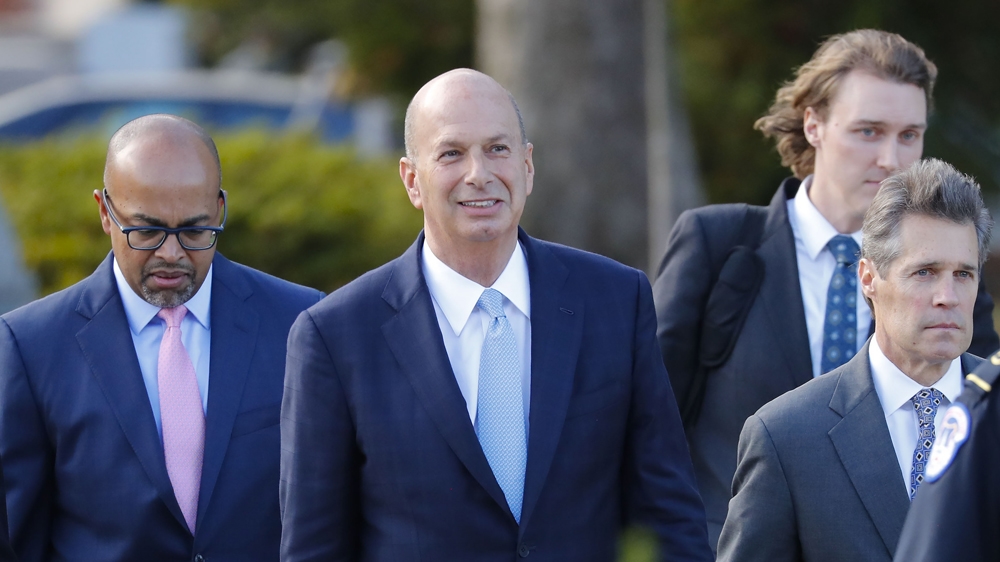
The White House said the Sondland transcript undermined the impeachment inquiry. White House spokeswoman Stephanie Grisham pointed to Sondland’s inability to say who ordered the aid to Ukraine be withheld and that he admitted he “presumed” there was a link between the demand for a statement from the Ukrainians and releasing the aid.
“No amount of salacious media-biased headlines, which are clearly designed to influence the narrative, change the fact that the president has done nothing wrong,” Grisham said in a statement.
Sondland sent a text message in September in which he said Trump insisted there was “no quid pro quos”.
But according to his testimony, he told a Ukrainian presidential adviser that the “resumption of US aid would likely not occur until Ukraine provided the public anti-corruption statement that we had been discussing for many weeks”.
Read more about Sondland’s testimony here.
3. Transcripts, transcripts and more transcripts
The transcripts of Kurt Volker, Michael McKinely, Marie Yovanovitch, William Taylor, George Kent, Fiona Hill and Alexander Vindman were also released this week.
Kurt Volker
Volker, Trump’s former special representative for Ukraine negotiations, detailed what he described as the role of Trump’s personal lawyer, Rudy Giuliani, as a conduit between Washington and Kyiv.
Volker and Sondland, with Trump’s secretary of energy, Rick Perry, were known as the “three amigos”, responsible for Trump’s unofficial channel to Ukrainian government officials, witnesses testified.
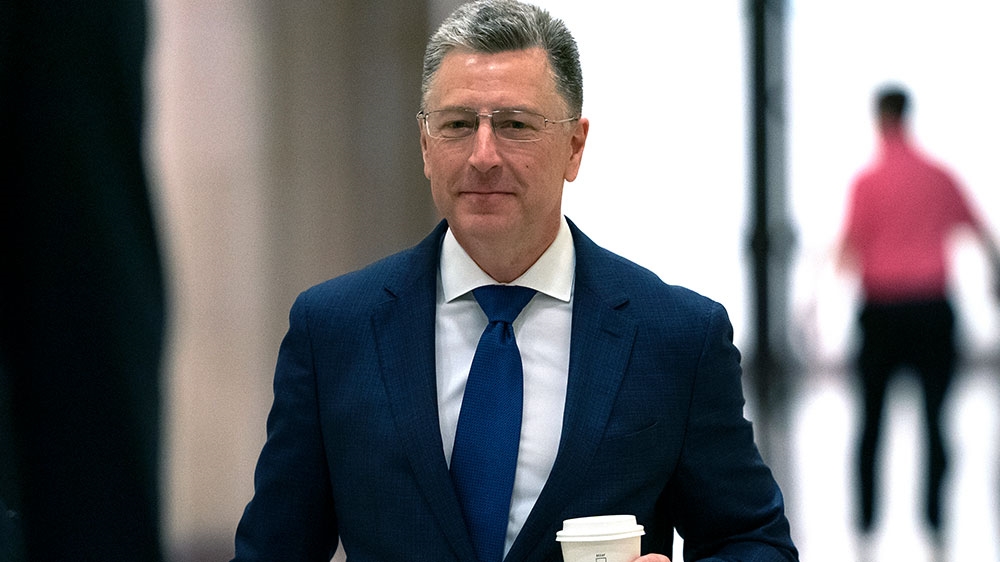
Volker said his decision to resign on September 27 was because of the impeachment inquiry.
“I didn’t think I would be able to go to Ukraine or meet with Russians and be able to carry out those duties in that way anymore,” he said. He also said he wanted to provide testimony “with as much candour and integrity as I possibly could”.
Marie Yovanvitch
Yovanovitch, who was abruptly removed from her post as the US ambassador to Ukraine in May, told the inquiry on October 11 that she felt threatened by Trump describing her on the call to Zelenskyy as “bad news” a transcript showed.
“I was very concerned,” she said. “I still am.”
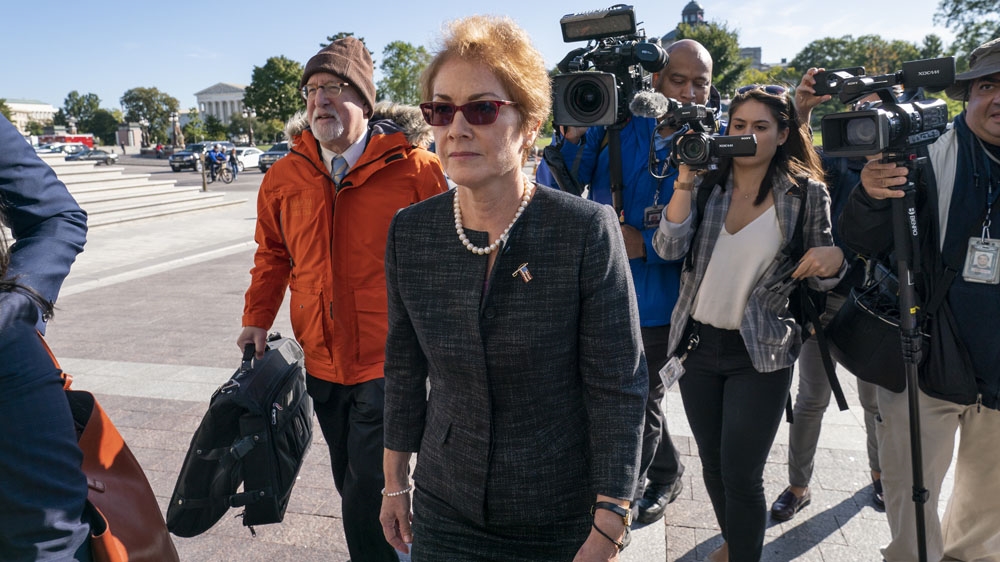
A previously released White House summary of the call showed that Trump told Zelenskyy that the ambassador was “bad news” and was going to “go through some things”.
Yovanovitch also told investigators she had been told to “watch my back” and that people were “looking to hurt” her.
Michael McKinley
McKinley told the inquiry last month that he recommended a statement of support for the now-removed US ambassador to Ukraine, Yovanovitch, but was told US Secretary of State Mike Pompeo decided “better not to … at this time”.
“The timing of my resignation was the result of two overriding concerns: the failure, in my view, of the State Department to offer support to Foreign Service employees caught up in the impeachment inquiry; and, second, by what appears to be the utilisation of our ambassadors overseas to advance domestic political objectives,” McKinley said, according to the transcript released by House committees.
William Taylor
Taylor, the top US diplomat in Ukraine, told the investigators he understood that the security assistance, and not just a White House meeting for Ukraine’s new president, was conditioned on the country committing to investigations of Joe Biden and the 2016 election.
“That was my clear understanding, security assistance money would not come until the president committed to pursue the investigation,” Taylor said.
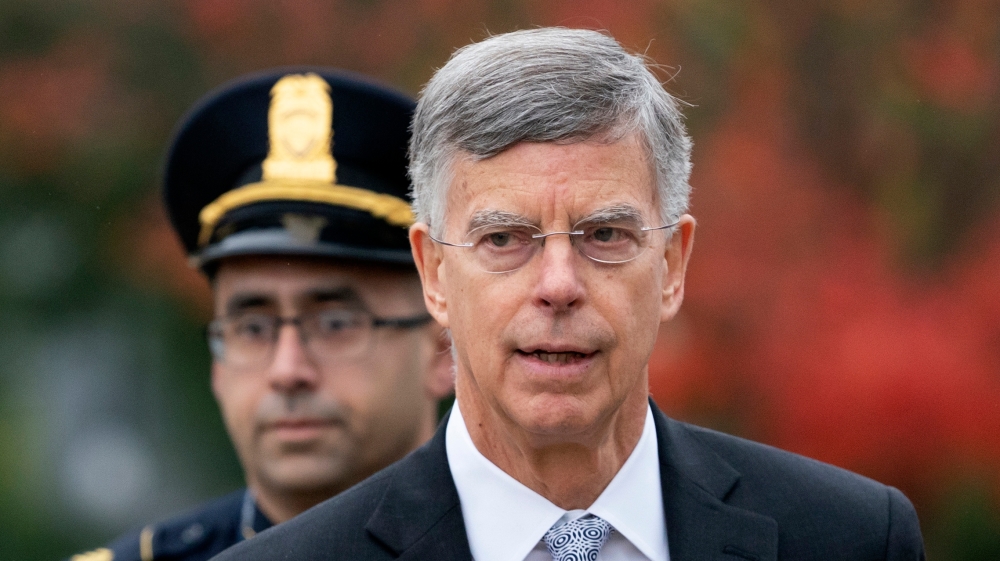
Politicians asked if he was aware that “quid pro quo” meant “this for that”.
“I am,” Taylor replied.
George Kent
Kent, a deputy assistant secretary of state, told the Trump impeachment inquiry that he was subject to attacks by Giuliani but was told to “keep my head down” by a senior State Department official.
Giuliani is central to the inquiry and has been mentioned frequently in testimony by State Department diplomats who have painted a picture of the former New York City mayor running a shadow US policy toward Ukraine to pressure it to carry out a corruption investigation into Biden and his son.
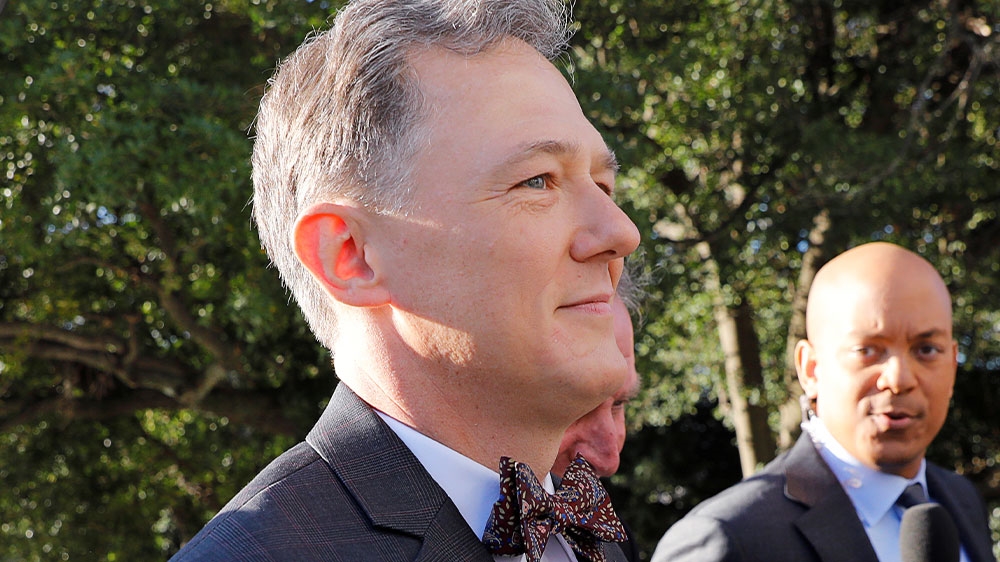
Kent mentioned Giuliani 73 times.
“His assertions and allegations against former Ambassador Yovanovitch were without basis, untrue, period,” Kent testified, referring to the Trump lawyer.
“Mr Giuliani, at that point, had been carrying on a campaign for several months full of lies and incorrect information about Ambassador Yovanovitch, so this was a continuation of his campaign of lies,” Kent said.
Giuliani has not commented on Kent’s testimony, but has said he played a role in the effort to remove Yovanovitch.
Kent said Ukrainian officials understood when they met Giuliani that he was not a regular private citizen and understood he represented Trump.
“Giuliani was not consulting with the State Department about what he was doing in the first half of 2019. And to the best of my knowledge, he’s never suggested that he was promoting US policy,” Kent said.
Kent also said that “POTUS wanted nothing less than President Zelenskyy to go to the microphone and say investigations, Biden and Clinton”.
According to the transcripts, he added: “That was the message … Zelenskyy needed to go to a microphone and basically, there needed to be three words in the message, and that was the shorthand.”
Fiona Hill
Hill, a former White House Russia adviser, said that during a White House meeting, Trump’s then-National Security Adviser John Bolton “immediately stiffened” as Sondland “blurted out: Well, we will have an agreement” with Mick Mulvaney, the acting White House chief of staff, “for a meeting if these investigations in the energy sector start” – a reference to the firm, Burisma, where Biden’s son was on a board.
Hill said then Bolton abruptly ended the meeting.
Alexander Vindman
Vindman, an Army officer assigned to the National Security Council, said he alerted superiors on two occasions, including after he listened to the July 25 call between Trump and Zelenskyy.
He also said there was “no ambiguity” that Sondland told Ukrainian officials to investigate the Bidens.
“There was no ambiguity. I guess, in my mind. He was calling for something, calling for an investigation that didn’t exist into the Bidens,” Vindman said.
He added that the US-Ukraine relations “is damaged” and “will continue to be damaged and undercut”.
4. More no-shows
A number of current and former Trump administration officials did not show up for their scheduled testimony this week, heeding to White House instructions to not comply with the investigation.
Among them was John Bolton, the former national security adviser who was forced out by Trump earlier this year.
A US House of Representatives Intelligence Committee official said that Bolton has threatened to take the committee to court if it subpoenas him. A congressional source to Reuters news agency said the inquiry is unlikely to go down that route.
The Washington Post, citing people familiar with Bolton’s views, said although he is willing, he wants to see how a court battle between Congress and the White House over the constitutionality of the subpoenas shakes out first. The battle is likely to go to the Supreme Court and could spill into next year.

Members of the committees conducting the inquiry have said they want to see if Bolton will corroborate previous witnesses’ testimony that he was alarmed at Trump asking a foreign government to get involved in domestic politics.
On Friday, the New York Times reported that Bolton’s lawyer said that his client was “part of many relevant meetings and conversations” pertaining the the impeachment inquiry.
Charles Cooper made the revelation in a letter that suggests Bolton will appear before Congress only if a judge orders him to do so.
The letter, addressed to the top lawyer for the House of Representatives, seeks to distinguish Bolton and former deputy Charles Kupperman from other current and former White House officials who have testified so far to impeachment investigators. The letter said that Bolton and Kupperman, unlike the other witnesses, provided direct advice to Trump regularly and would be asked during any congressional appearance to disclose sensitive foreign policy and national security information.
“As I emphasised in my previous responses to letters from the House Chairs, Dr Kupperman stands ready, as does Ambassador Bolton, to testify if the Judiciary resolves the conflict in favour of the legislative branch’s position respecting such testimony,” Cooper wrote.
Mick Mulvaney, Trump’s acting chief of staff, also failed to appear for a scheduled deposition.
Democrats subpoenaed Mulvaney late on Thursday as the White House signalled that he would not appear.
An official working on the inquiry told the Associated Press that Mulvaney’s lawyer informed the committees leading the impeachment probe one minute before the deposition was supposed to start that Mulvaney had been directed not to comply with the subpoena. The person said Mulvaney’s lawyer said he has “absolute immunity”, a claim that Democrats have challenged in court for other administration witnesses.

Mulvaney said in a news conference last month that the Trump administration’s decision to hold up military aid was linked to Trump’s demand for the investigations. He later walked back his remarks, but Democrats said that was tantamount to a confession and have cited it as evidence in their inquiry.
5. Who did appear?
Jennifer Williams, a career foreign service officer and special adviser to Vice President Mike Pence for Europe and Russia, did testify in a closed-door hearing in front of members of the House of Representatives Foreign Affairs, Intelligence and Oversight committees after receiving a subpoena to compel her testimony.
Williams was one of a handful of US officials who listened in on the call between Trump and the Ukrainian leader.
Williams told investigators she found Trump’s July call with Zelenskyy unusual because it was political, not diplomatic in nature, CNN reported, citing an unnamed source.
But she did not raise concerns about the call with her superiors and, when asked what Pence knew, said she never heard him mention anything about investigations of the 2016 elections, Burisma or the Bidens.
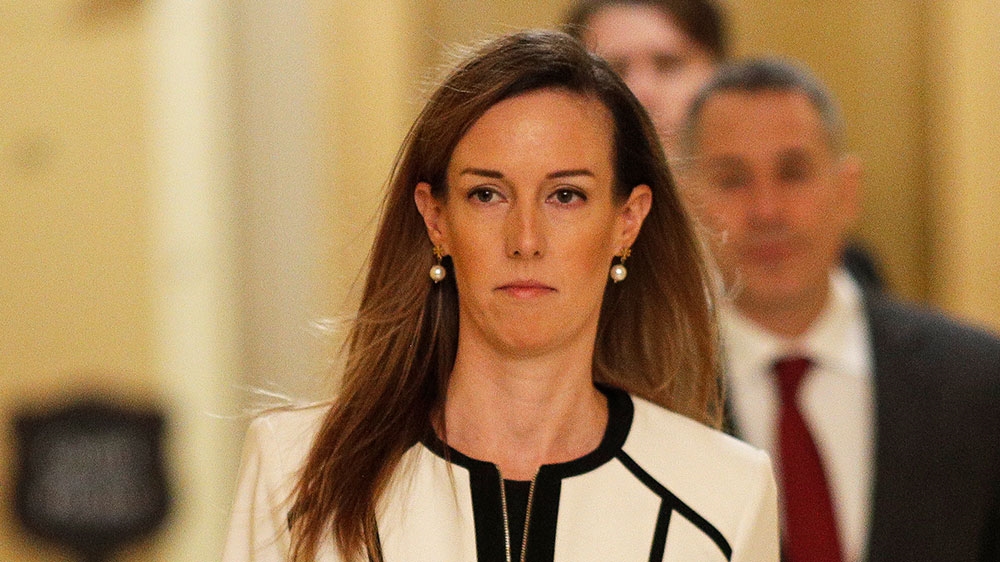
The State Department’s third-ranking official also testified this week.
David Hale met with investigators for more than six hours. He was expected to tell the House committees that political considerations were behind the State Department’s refusal to deliver a robust defence of former Ambassador to Ukraine Yovanovitch.
Read more here.
6. Lev Parnas will comply: Reuters
Lev Parnas, an indicted Ukrainian American businessman who has ties to President Donald Trump’s personal lawyer, Giuliani, is now prepared to comply with requests for records and testimony from congressional impeachment investigators, his lawyer told Reuters News Agency this week.
Parnas helped Giuliani look for dirt on Biden.
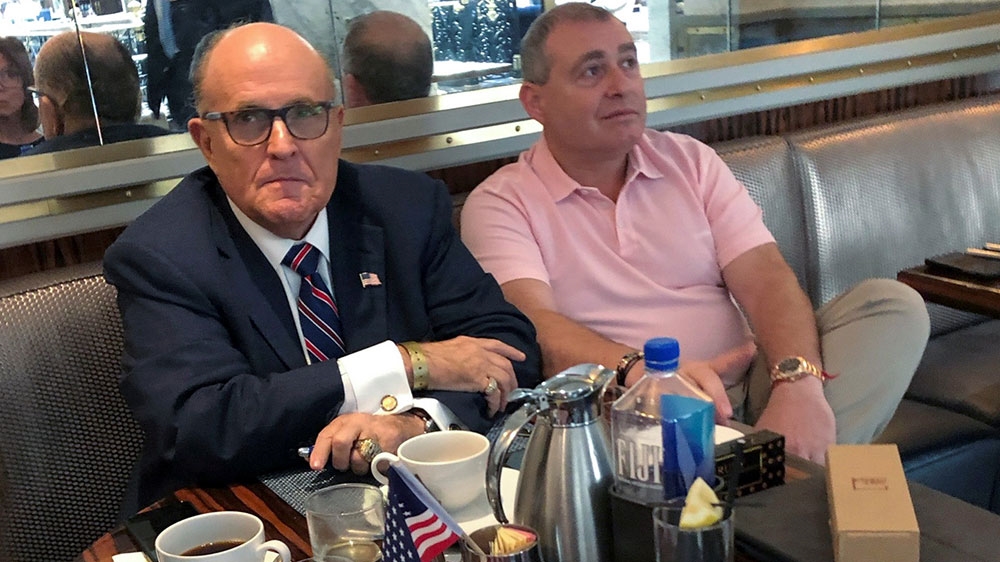
His apparent decision to work with the congressional committees represents a change of heart. Parnas rebuffed a request from three House of Representatives committees last month to provide documents and testimony.
“We will honour and not avoid the committee’s requests to the extent they are legally proper, while scrupulously protecting Mr Parnas’s privileges including that of the Fifth Amendment,” said the lawyer, Joseph Bondy, referring to his client’s constitutional right to avoid self-incrimination.
7. Trump may release summary of April call with Zelenskyy
Trump said on Friday that he is considering releasing the transcript of an April call he had with Zelenskyy.
He says that if House investigators want to see a summary of the April 21 call, he has “no problem” giving it to them.
That call came three months before the July 25 call that sparked the impeachment inquiry.
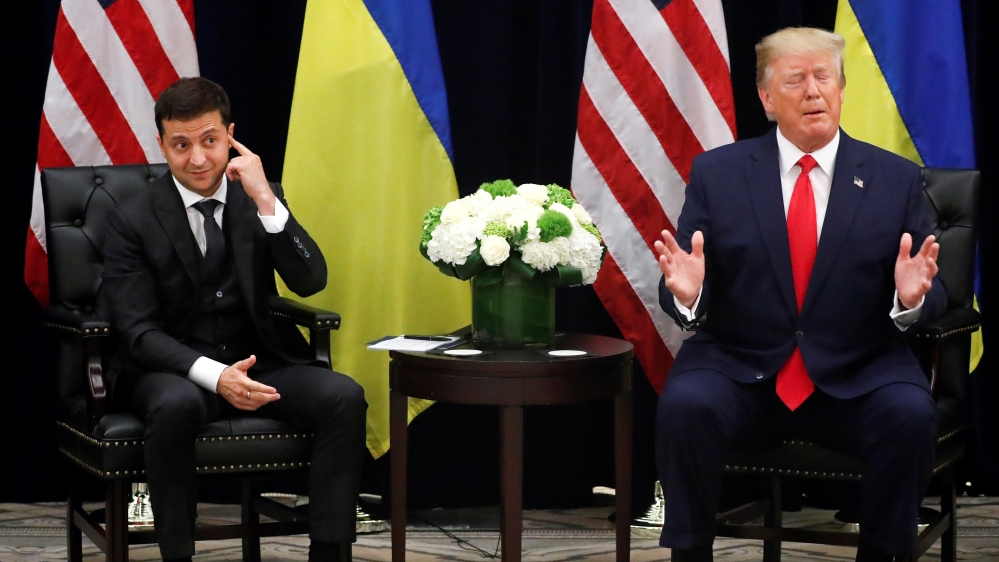
Trump on Friday also dismissed the significance of the impeachment inquiry testimony that has been released so far.
He said, “No one seems to have any first-hand knowledge” and claims that, “Every one of those people cancelled themselves out.”
He’s criticised Democrats in the House for planning public hearings, even though the White House pushed for them to happen.
8. Did Trump ask DOJ to publicly clear him?
Trump on Thursday denied a report that he wanted Attorney General William Barr to hold a news conference to declare he broke no laws during a July phone call in which Trump pressed his Ukrainian counterpart to investigate Democrats.
Trump tweeted just after midnight that the story, first reported by The Washington Post, “is totally untrue and just another FAKE NEWS story with anonymous sources that don’t exist”.
The Washington Post reported that Barr rebuffed the request, which came in September around the time the White House released a rough transcript of Trump’s July 25 call. The paper, citing unidentified people familiar with the effort, said the request was relayed from the president to White House officials, and then to the Justice Department.
Read more here.
9. White House adds aides to deal with impeachment investigation
The White House is beefing up its communications staff as it tries to grapple with the ongoing House impeachment investigation.
Pam Bondi, the former attorney general of Florida, and Tony Sayegh, a former Treasury Department spokesman, are expected to join the White House communications team to work on “proactive impeachment messaging” and other special projects, a senior administration official told The Associated Press.
The official, who spoke on condition of anonymity to discuss internal staffing, said that the roles would be temporary and that Bondi and Sayegh would be working as special government employees.
10. Whistle-blower offers to take written questions
The whistle-blower has offered to answer written questions submitted by House Republicans, his lawyers said.
The surprise offer on Sunday, made to Devin Nunes, the top Republican on the intelligence committee leading the inquiry, would allow Republicans to ask questions of the whistle-blower without having to go through the committee’s Democratic chairman, Adam Schiff.
Lawyer Mark Zaid tweeted the whistle-blower would answer questions directly from Republican members “in writing, under oath & penalty of perjury”, part of a bid to stem escalating efforts by Trump and his allies to unmask the person’s identity.
Only queries seeking the person’s identity will not be answered, he said, adding the Republican bid to expose his client’s identity “could jeopardise their safety, as well as that of their family”.
“We will ensure timely answers,” he said.
Democrats have said they no longer need to hear from the whistle-blower, citing witnesses who have largely corroborated the individual’s account of the July 25 call that prompted the whistle-blower complaint.
Meanwhile, some Republicans appear set on unmasking the whistle-blower.
The individual’s lawyer, sent a cease-and-desist letter to White House Counsel Pat Cipollone, on Thursday, saying: “Let me be clear: should any harm befall any suspected named whistle-blower or their family, the blame will rest squarely with your client.”
Republican Senator Rand Paul told reporters this week that he would view the whistle-blower as “a material witness” who could support Trump’s allegations of corruption against Biden, should the House impeachment drive lead to a Senate trial. “They absolutely need to testify,” Paul said. “He could well have firsthand knowledge.”
Representative Jim Jordan, a staunch Trump ally and leading Republican opponent of the inquiry, said on Thursday that Republicans intend to subpoena the whistle-blower to testify in public. House Democrats have accused Republican politicians of using closed-door testimony to try to learn the whistle-blower’s identity from witnesses.